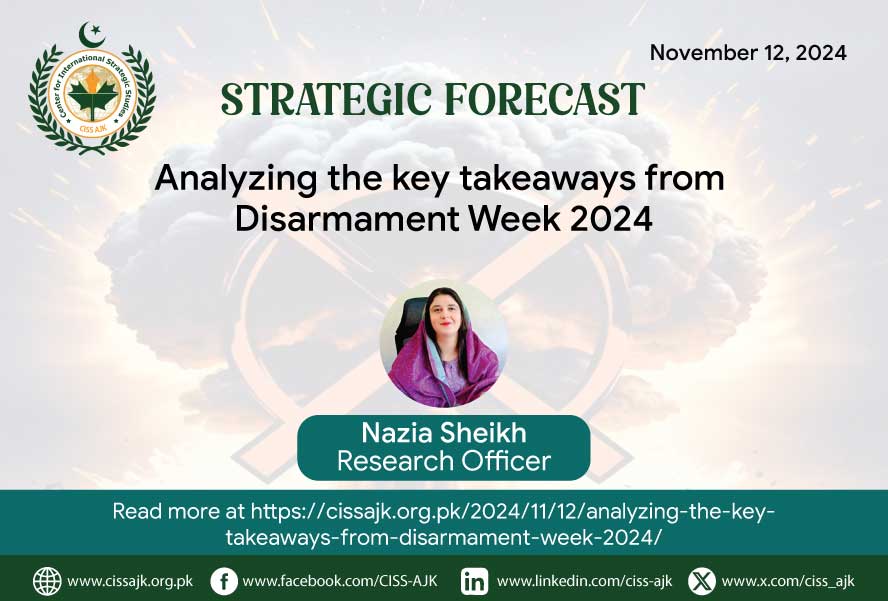Global initiatives to promote arms control have come into focus as the world commemorated UN Disarmament Week from October 24th to 30th. This observance places pressure on governments to pursue disarmament and curb the proliferation of weapons of mass destruction (WMDs), which exacerbate violence and intensify conflict. At a time when disarmament faces significant challenges, international tensions have escalated, with conflicts such as the Russia-Ukraine war, civil wars in Syria and Yemen, and grievous violations against civilians in Kashmir, Sudan, and the Palestinian Territories.
Disarmament Week is a significant event on the calendar to raise the issues and tackle all these challenges to make the world safer from the adverse effects of these weapons. The United Nations established Disarmament Week in 1978 to urge countries to concentrate on disarmament and arms reduction initiatives, which is still a vital objective with ongoing global conflicts. With 238,000 deaths in the last year alone, witnessing a record number of conflicts worldwide since World War II. The need for arms control is more urgent than ever, with over 90 nations engaged in global conflicts. In his way, disarmament measures are important for preserving global peace and security, protecting civilians, advancing sustainable development, fostering confidence and trust among states, and preventing and ending armed conflict.
Highlights of the disarmament week were the UNODA Regional Directors’ briefings to participants on their role in addressing new trends, opportunities, and challenges in the areas of non-proliferation, arms control, and disarmament at the regional and national levels. The United Nations Office for Disarmament Affairs (UNODA), the Organization for the Prohibition of Chemical Weapons (OPCW), the International Atomic Energy Agency (IAEA), and the Comprehensive Nuclear Test Ban Treaty Organization (CTBTO) also collaborated to host a side event on the sidelines of the UNGA First Committee on October 25, 2024, to examine how the effectiveness of current weapons of mass destruction( WMDs) disarmament and non-proliferation regimes may be impacted by rapid scientific and technological advancements and how those regimes are adapting to stay strong and functional.
The UN also emphasized the necessity of modifying the current non-proliferation arms control and nuclear disarmament regime, beginning with the Treaty on the Nonproliferation of Nuclear Weapons, to reflect the constantly changing security environment. However, it also highlighted the necessity of utilizing the incredible potential of new and developing technologies to promote and assist non-proliferation and disarmament. States urge the need to make use of scientific and technological advancements to strengthen safeguards for nuclear materials, support the verification of nuclear disarmament progress, identify any nuclear testing, and avoid miscalculations, all of which have a broad reach.
Moreover, the UN Mine Action Service, which organizes mine-related activities and promotes a world free of landmines and explosive relics of war, was part of ongoing efforts to eradicate landmines.
There have been very fruitful discussions in Geneva within the framework of the BWC Working Group’s mandate from the Ninth Review Conference to agree on an International Cooperation and Assistance Mechanism to find a balance between the measures required to prevent non-proliferation and avoid impeding economic and technological development that supports it.
Chemical weapons have comparable risks. The potential for AI to be used to develop new chemical weapons that are more potent than existing chemical warfare agents has sparked worries. AI is already capable of creating formulations for fresh, hazardous, and toxic substances. The establishment of the Organization for the Prohibition of Chemical Weapons (OPCW) Temporary Working Group on AI is a positive step in the direction of the OPCW Technical Secretariat’s ongoing evaluation of the implications and possible applications of emerging technology.
To fulfill common commitments to prevent the proliferation of all weapons of mass destruction, states ensure that sufficient mechanisms are in place to prevent non-state actors, such as terrorist organizations and criminals, from utilizing these technologies. UN Secretary-General António Guterres presented the agenda for Disarmament by defining four key pillars which are preserving humanity, saving lives, safeguarding a shared future in the face of conventional weapons, developing cyberwarfare, and WMDs, and strengthening partnerships for disarmament.
Pakistan’s advocate of multilateralism and is a key player in promoting global peace and security. For Pakistan, a robust, non-discriminatory, rules-based international order is the only way to guarantee peace and stability. Pakistan believes that the global non-proliferation regime must be rule-based, non-discriminatory, and provide equal consideration to the security needs of all governments rather than caving into the demands of the few.
Disarmament Week concluded with urges for governments to give disarmament and sustainable development a top priority and serves as a reminder of the value of international collaboration in creating a safer, more peaceful world. To preserve global peace and security, foster communication, and avert wars, the UN’s unbiased role is essential.
Author: Nazia Sheikh
Email: Nsheikh536@gmail.com
Bio: Nazia Sheikh is a Research Officer at the Centre for International Strategic Studies, AJK. She is an MPhil scholar in international relations from the International Islamic university Islamabad.

